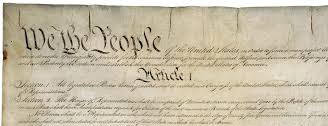Today, May 29, 2019, Robert Mueller addressed the public on camera for ten minutes. He did not take questions after, and he said at the end that he intended for this to be his only statement to the public and that, if he is subpoenaed to testify before Congress, he will have nothing to say other than what is in the report.
So…what did he have to say in those ten minutes? Some pretty potent stuff, actually.
The Mueller report has two parts to it. Part one is about Russian interference in the 2016 election and whether Trump colluded. On that, the report clearly says that there is no evidence to charge Trump with colluding with the Russian hackers. But that’s just part one. The interesting part is part two: that part deals with any attempts that might have been made to obstruct the Mueller investigation during these two years that it was going on. For that, I’m going to hand the phone to Mr. Mueller. Here’s the passage that really gets to the heart of it.
And as set forth in the report, after that investigation, if we had had confidence that the president clearly did not commit a crime, we would have said so. We did not, however, make a determination as to whether the president did commit a crime.
The introduction to the Volume 2 of our report explains that decision. It explains that under long-standing department policy, a president cannot be charged with a federal crime while he is in office. That is unconstitutional. Even if the charge is kept under seal and hidden from public view, that, too, is prohibited.
A special counsel’s office is part of the Department of Justice, and by regulation, it was bound by that department policy. Charging the president with a crime was therefore not an option we could consider, The department’s written opinion explaining the policy makes several important points that further informed our handling of the obstruction investigation. Those points are summarized in our report and I will describe two of them for you.
First, the opinion explicitly permits the investigation of a sitting president because it is important to preserve evidence while memories are fresh and documents available. Among other things, that evidence could be used if there were co-conspirators who could be charged now.
And second, the opinion says that the Constitution requires a process other than the criminal justice system to formally accuse a sitting president of wrongdoing.
And beyond department policy, we were guided by principles of fairness. It would be unfair to potentially — it would be unfair to potentially accuse somebody of a crime when there can be no court resolution of the actual charge.
So that was Justice Department policy. Those were the principles under which we operated. And from them, we concluded that we would not reach a determination one way or the other about whether the president committed a crime. That is the office’s final position and we will not comment on any other conclusions or hypotheticals about the president.
Do you get it? Mueller is EXPLICITLY saying that if there had been rock-solid evidence that Trump committed a crime by attempting to obstruct justice, the Mueller report still would have said exactly what it says now, because (1) a sitting president can’t be indicted, and (2) it’s not fair to accuse a person of a crime when there can’t be a trial to judge the accusation.
And the reason he wouldn’t take questions, I’m sure, is that there was an obvious question that he didn’t want to have to deal with: “If there were no rule against indicting a sitting president, would you have tried to get an indictment?”
A sitting president can, of course, be impeached. Mueller mentions that option as existing. And this ten-minute statement has very much energized the sector of the Democratic Party that wants to see it happen.
Full transcript and video of Mueller’s statement on Politico
Politico article about impeachment debate (including video of Nancy Pelosi’s remarks), May 29, 2019
It’s heating up. The drama has barely begun. Stay tuned.



